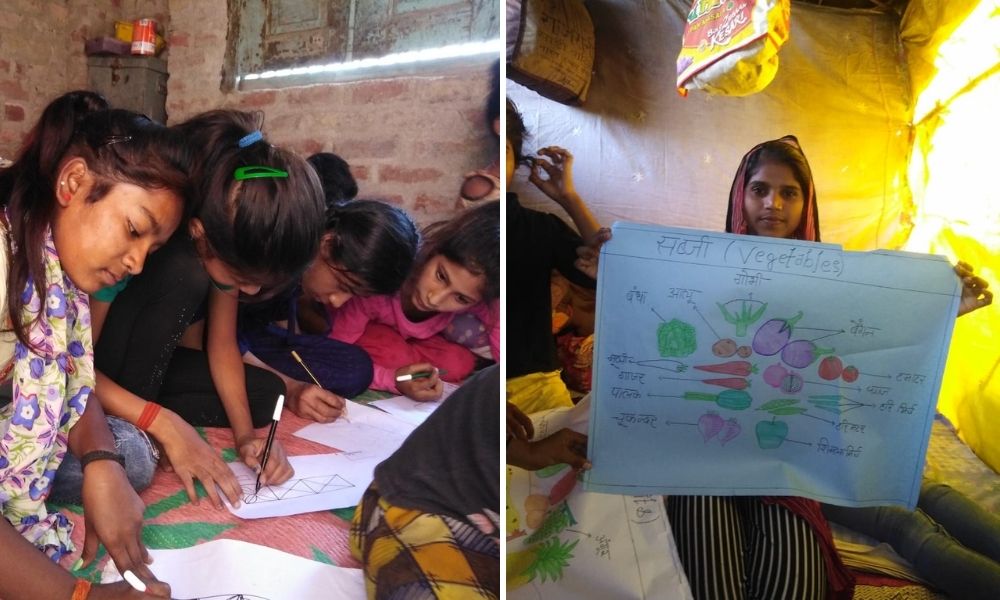
Image Credits: Commutiny
This 22-Year-Old Is Changing How Her Community Talks About Menstruation
Writer: Kritika Narula
Kritika Narula is a writer, journalist and communications consultant based in Delhi
India, 27 Jun 2021 4:57 AM GMT | Updated 27 Jun 2021 5:04 AM GMT
Creatives : Kumar Vibhanshu |
I believe that everyone has a story to tell, all you have to do is listen. I like learning new things and believe that there can never be an end to learning, and the biggest room in this world is the Room for Improvement. Seekhte Raho........
Guest Author : Kritika Narula
Kritika Narula is a writer, journalist and communications consultant based in Delhi
She noticed that many families hesitate to talk about health openly, that they still carry taboos and archaic beliefs related to menstruation.
Ankita Shankar, all of 22 years, loves interacting with her community in Durgapuri, Lucknow. Her first tryst with community work was during the summer of 2020 when she was among the 1 million people on the field involved in the data collection exercise through a door-to-door survey exercise for the Economic Survey of India (ESI).
During this stint, Ankita came in contact with a 'Zabardast Jagrik' working as a part of ComMutiny – The Youth Collective's Be A Jagrik project being run in collaboration with Yeh Ek Soch Foundation. YES Foundation is also a part of vartaLeap that works towards mainstreaming youth-centric development. Jagrik is a paronomasic combination of jagruk + nagrik, together meaning an aware citizen. She decided she wanted to use her voice for a better, open, taboo-free society as well.
Ankita wanted to be a 'Jagrik'!
So, when the opportunity came for her to play an active role as an agent of positive change, she grabbed the chance wholeheartedly and joined one of the social action projects. Using the skills she acquired through the ESI exercise, she proceeded to conduct a door-to-door survey to spread awareness about sexual and reproductive rights. The survey exercise was eye-opening and informative, as she asked questions about health facilities in her community, exploring the issues around healthcare access and programmes like ASHA, Janani Suraksha Yojana, among others.
It was during these conversations with the community that she started noticing little things that'd otherwise fall through the cracks when it comes to conversations around health. She noticed that many families hesitate to talk about health openly, that they still carry taboos and archaic beliefs — they don't let the girls participate in social activities when they're on their period, or even talk about periods when they start getting them first. All of this increases the risks that people — especially, women — encounter to access healthcare.
"When I was conducting the Economic Survey, I could clearly see that the girls in the households were evidently reticent. It felt as though they'd not be able to stand up for themselves, should there be a need. Or that they'll be unable to openly express any physical disbalance they might be feeling in their bodies," Ankita shares.
She was concerned that the girls might not recognize symptoms if they're indisposed, or might be too shy to share. So Ankita — ever the doer and go-getter — decided to do something about it. She started conducting awareness and knowledge-building sessions with young girls. In these sessions, she discusses a wide range of health-related concerns: from menstruation to nutritional deficiencies, from taboos related to periods to information on balanced diets.
"Even young boys join the sessions sometimes," Ankita beams.
In a community that actively discourages girls from venturing out, this is no small feat. In the sessions, she busts the many myths that exist around menstruation, including the most common taboos like women not being allowed to touch pickles or enter places of worship. Ankita is enthusiastic about shooting down these taboos with knowledge, "Knowledge is my weapon against these myths. So, we hold space for a discussion around the myths. We get to the bottom of it: why do the myths exist in the first place, how there is little to no sense to the stories behind these myths, and what could be the scientific approach of looking at it? For instance: Menstruation causes no spoilage or contamination at all! Slowly, the girls are understanding that most of the taboos that they were asked to believe in are actually quite illogical and even patriarchal in a lot of cases."
Shooting down taboos isn't an easy journey, however. Ankita works in pair with Priya, another advocate of sexual and reproductive rights in the community as a part of the Social Action Project. Convincing people to attend these sessions is possibly the biggest and the hardest challenge for them. Ankita shares, "Initially, there was a lot of reluctance on their part: they didn't see any merit in attending the sessions. We had to stay at it patiently, in order to convince them while we also made the sessions more engaging which slowly added to curiosity and inclination to attend. We created games and fun activities around the issues: something as simple as a colouring activity to explain healthy diets worked wonders to establish a rapport before we could dive into more serious, more controversial topics." Over time Ankita's own convincing skills and other interpersonal skills have improved, "I can read a room and adjust my strategy accordingly to get the best response," she adds.
Has Ankita observed any tangible impact in the community through her sessions? She shares how the girls who were once too afraid to speak up initially have started putting forth their opinions fearlessly. This feels like a milestone in a community where girls had been previously relegated to passive roles. The efforts of champions like Ankita mean that they collectively already have a foot in the door for lasting change. They are at the cusp of sustainable change, towards a future where conversations around health and hygiene would be normalised. What would follow, hopefully, are more efficient and accessible health interventions in the future.
 All section
All section















